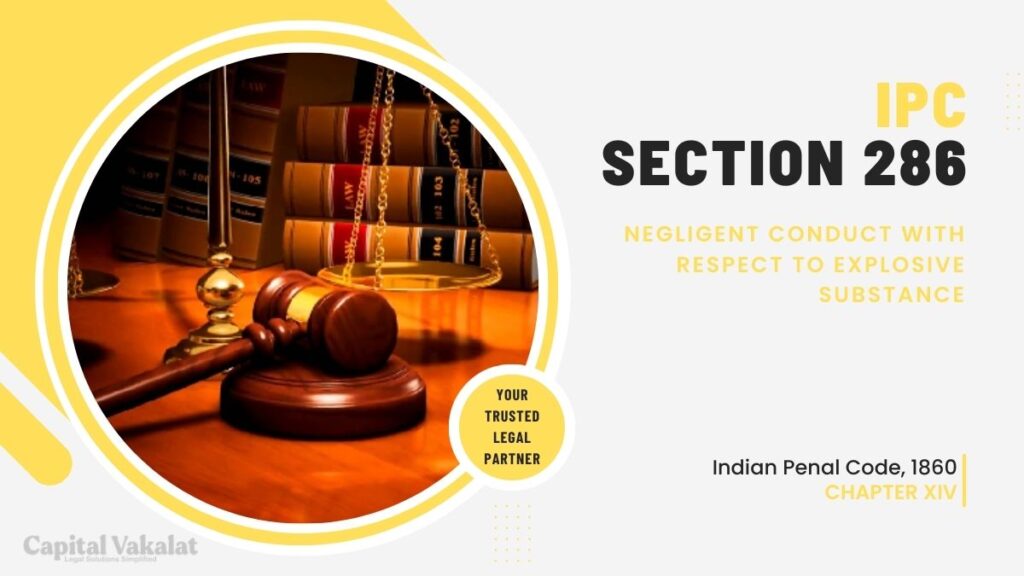In this comprehensive article, we will delve into Section 286 of the Indian Penal Code (IPC) and its implications concerning negligent conduct with respect to explosive substances. We will explore the legal aspects, definitions, punishments, and the importance of this section in maintaining public safety.

Whether you’re a legal enthusiast or just curious about the law, this article will provide you with valuable insights and knowledge about Section 286 IPC.
Introduction to Section 286 IPC
Section 286 of the Indian Penal Code, commonly referred to as IPC, deals with the criminal liability of individuals who exhibit negligent conduct concerning explosive substances. This section aims to prevent accidents and safeguard public safety by holding individuals accountable for their actions or inactions.
Understanding Negligent Conduct
Negligent conduct refers to behavior or actions that lack due care and caution. It involves a failure to take reasonable steps to prevent harm or injury to oneself or others. In the context of Section 286 IPC, negligent conduct with explosive substances could lead to catastrophic consequences.
Explosive Substances: Definition and Types
Explosive substances encompass a wide range of materials that can explode or ignite when subjected to certain conditions. These substances can vary from fireworks and industrial explosives to chemical compounds used in various applications.
Provisions of Section 286 IPC
Section 286 IPC states that anyone who endangers the lives of others by negligently conducting themselves in a manner that involves explosive substances can be held criminally liable. The section sets clear parameters for what constitutes negligent conduct in such situations.
Punishments under Section 286 IPC
The penalties under Section 286 IPC may include imprisonment, fines, or both, depending on the severity of the negligence and the potential harm caused by the explosive substance. This section ensures that those who act recklessly with explosives face appropriate consequences.
Landmark Cases
To gain a better understanding of how Section 286 IPC is applied, we will examine some landmark cases where individuals were prosecuted under this section. These cases provide real-world examples of the legal implications.
Importance of Section 286 IPC
Section 286 IPC is crucial for maintaining public safety and preventing accidents related to explosive substances. It discourages individuals from engaging in risky behavior and encourages responsible handling of such materials.
Safety Measures for Handling Explosive Substances
In this section, we will discuss the safety measures and precautions that should be taken when handling explosive substances, whether in a professional or personal capacity. Understanding these guidelines is essential for preventing accidents.
Legal Relevance and Implications
We will explore the legal relevance of Section 286 IPC in contemporary society and its implications for individuals, industries, and the legal system. Understanding the importance of this section is vital for maintaining a safe environment.
Conclusion
In conclusion, Section 286 IPC serves as a legal safeguard against negligent conduct involving explosive substances. It not only deters irresponsible behavior but also promotes the responsible handling of such materials. Public safety is a paramount concern, and this section plays a vital role in ensuring it.
This article has provided a thorough exploration of Section 286 IPC, negligent conduct with respect to explosive substances, and its legal implications. It underscores the importance of responsible behavior when dealing with explosive materials and the legal consequences for negligence.
Frequently Asked Questions
What are the potential punishments under Section 286 IPC?
The penalties for violating Section 286 IPC may include imprisonment, fines, or both, depending on the severity of the negligence and the potential harm caused by the explosive substance.
Why is Section 286 IPC important?
Section 286 IPC is crucial for maintaining public safety and preventing accidents related to explosive substances. It discourages individuals from engaging in risky behavior and encourages responsible handling of such materials.
What are some safety measures for handling explosive substances?
Safety measures for handling explosive substances include proper storage, transportation, and disposal, following safety protocols, and ensuring the appropriate training and knowledge in handling such materials.